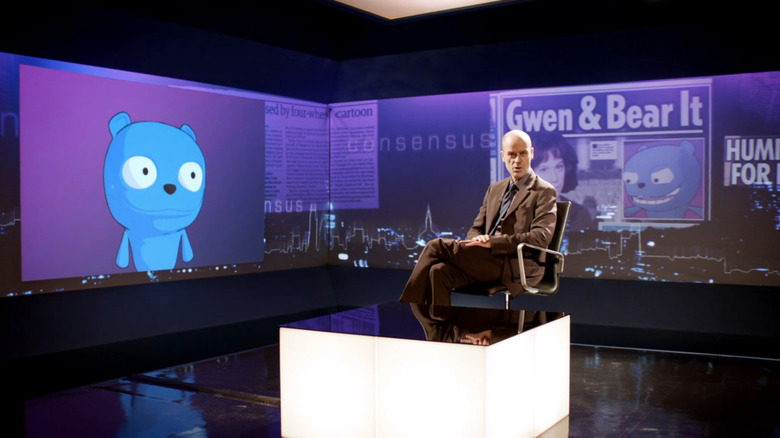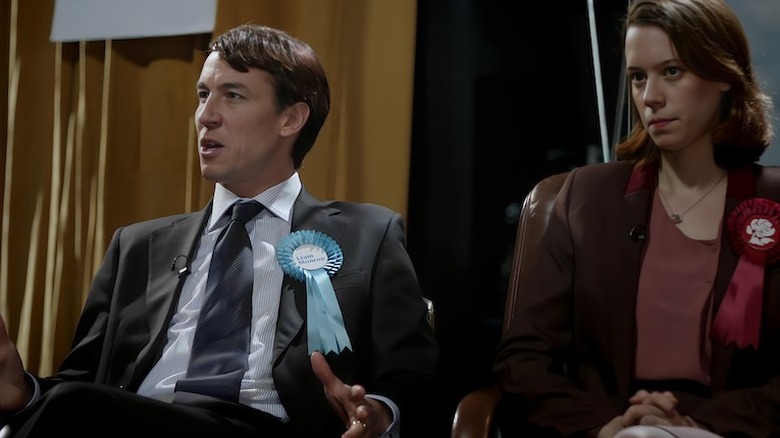Black Mirror's Worst Episode (So Far) According To Rotten Tomatoes
As an anthology series, "Black Mirror" can afford to take some big swings. Since none of the episodes connect to each other (outside of a few cheekily placed Easter eggs like that recurring Irma Thomas song), each can afford to take radical departures from the rest. But although that approach has resulted in some of the best — not to mention the most terrifying — television in recent memory, not every episode is a winner. At its best, a "Black Mirror" episode can make you want to chuck your laptop in the bin, throw your phone into the ocean, and retreat to the mountains for a life of hermitage. But when an episode falters, it can come off as a tale told by an idiot, full of sound and fury, signifying nothing.
Rotten Tomatoes, the preeminent film aggregation and ratings site, shows us that one episode in particular left critics baffled and unimpressed. That would be Season 2's "The Waldo Moment," in which a man named Jamie (Daniel Rigby), who plays a blue cartoon bear named Waldo, is goaded into running for public office, turning him into a wrench in the gears of U.K. politics. We're no experts on foreign election laws, but the episode never explains why a fictional character like Waldo would be allowed to run for office. Meanwhile, the episode is packed with too many characters, all of whom read as paper-thin, unoriginal critiques of the political system. There's no softer satirical target than politics — the proliferation of "The Daily Show"-style political comedy is proof enough of that — but "The Waldo Moment" swings its misguided jabs with the force of a pool noodle, earning its place at the very bottom of the rankings.
The Waldo Moment had nothing new to say
Beyond a few moments that are interesting only for their shock value, "The Waldo Moment" has few redeeming qualities, landing it at the bottom of the "Black Mirror" pantheon for critics. A good episode of "Black Mirror," like "The Twilight Zone" before it, uses outlandish scenarios to highlight a fundamental truth about the real world. But "The Waldo Moment" seems unsure of what it wants to say, and so it meanders through a political farce, wearing its lack of confidence on its sleeve.
Some have argued, tepidly, that "The Waldo Moment" predicted the rise of political figures like Boris Johnson and Donald Trump. But to state the obvious, neither man is a big, blue cartoon bear, nor are they the dark horses Waldo eventually becomes in the political sphere. Johnson, despite his unkempt appearance and gaffe-prone personality, is a lifelong politician. And while Trump, formerly a TV personality before running for president, comes closer in concept to Waldo, you'd have to squint hard to make the comparison.
Compare "The Waldo Moment" to another "Black Mirror" political satire, Season 1's harrowing "The National Anthem," in which a British princess is kidnapped and, in exchange for her safety, the perpetrators demand the prime minister engage in bestiality with a pig on live television. Not only is "The National Anthem" far more engaging moment-to-moment, but it also ended up being far more predictive of future events. Before losing his premiership thanks to his mishandling of the Brexit referendum, David Cameron was accused by the Daily Mail of having violated a pig while a member of a secret student society at Oxford University in the 1980s.
The Waldo Moment split critics down the middle
At the time "The Waldo Moment" aired in February 2013, television was filled with sharp and incisive political satire from shows like HBO's "Veep" and Netflix's "House of Cards." The former was lauded as a caustically hilarious examination of the American political system's brokenness. The latter, while not a comedy, similarly examined the maneuverings of the political class, highlighting the unending cynicism of Washington's movers and shakers.
"The Waldo Moment" landed between those two monumental shows, exposing by comparison its relative lack of substantive critique. Many critics lambasted the episode, with Vulture writing, "... The political commentary goes too broad, accusing the public of being dum-dums and filing the tired charge that politicians are phony." Meanwhile, SFX Magazine dismissed the episode by stating, "It's also the weakest of the series, a disappointing attempt at political satire that's neither funny nor perceptive enough to stick in the memory."
Even so, not all critics were as unforgiving of "The Waldo Moment." The episode sits at exactly 50% on Rotten Tomatoes, proving that it evenly divided critical opinion. Much of the praise, however, came years after the episode had aired and focused on thin comparisons to the 2016 American presidential election. The New York Review of Books, in a "Black Mirror" retrospective from 2017, wrote of the episode, "Watching all of this, as I did the other night, you can hardly avoid thinking: this is what happened in the 2016 election. We are living in the Waldo moment."


